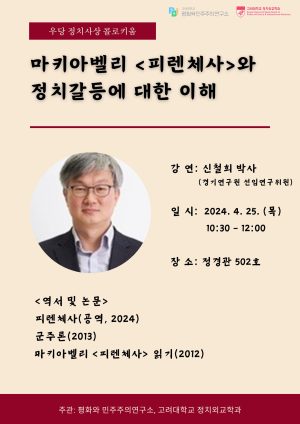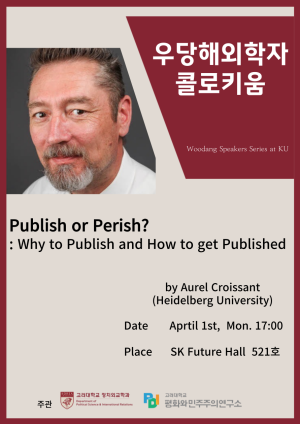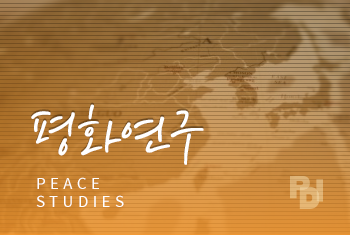Activities
-
Soodang/Woodang Colloquium
[Woodang Distinguished Speaker Colloquium #1] China’s Rise and Challenges to the United States, U.S. allies, and the International Order
2024.03.11 -
Soodang/Woodang Colloquium
[Soodang Distinguished Speaker Colloquium #27] Do International Bureaucrats Matter? Theory and Evidence from the International Monetary Fund
2023.12.10
News
-
[Woodang Political Thoughts Colloqium #1] Machiavelli’s Istorie Fiorentine and understanding of political conflicts

- Topic : Machiavelli’s <Istorie Fiorentine> and understanding of political conflicts
- Speaker : Chul Hee, Shin (Senior researcher of GRI)
- Date and Time : 25, April 2024 (Thursday) 10:30 am ~ 12:00pm
-
Venue : Political Science and Economics Building 502B
-
[Woodang Distinguished Speaker Colloquium #2] Publish or Perish? : Why to Publish and How to get Published

- Topic: Publish or Perish? : Why to Publish and How to get Published
- Speaker: Aurel Croissant (Heidelberg University)
- Date and Time: April, 1st (Monday 17:00)
-
Venue: Room 521, Korea University SK Future Hall
-
[Peace Studies] Call for Papers for Spring 2024 (Vol. 32, No. 1)
2024.02.06Peace Studies, a KCI-listed journal published biannually by the Peace & Democracy Institute (on April 30 and October 30), is pleased to invite submissions for the Spring issue of 2024. Peace Studies publishes academic papers related to peace in a broad sense. It covers various research topics related to political, economic, and social conflict and cooperation within countries, as well as structural, institutional, and normative approaches to international conflict resolution. Submissions are accepted on a rolling basis in both Korean and English. All manuscripts must be prepared in accordance with the Submission Guidelines provided by the Peace Research editorial board. Manuscripts which do not meet the guidelines can be rejected. The submission deadline for the 2024 Spring issue is at noon on March 4, 2024. Please submit the manuscript through our JAMS website. Please take the following steps to make a submission: Sign up (or log in) > [Journal] > [About Journals] > [Submit New Paper]. For any⋯
-
[Peace Studies] Announcement of the extension of the deadline for submitting manuscripts for the Autume issue 2023 (~September 8)
2023.09.04The deadline for submissions for the Autumn issue (2023) of Peace Studies, a KCI-listed journal published biannually by the Peace & Democracy Institute is extended as follows. Deadline for manuscript submissions(After): ~ September 8, 2023, 6PM Existing deadline(Before): ~ midnight on September 1, 2023 Submissions are accepted on a rolling basis in both Korean and English. All manuscripts must be prepared in accordance with the Submission Guidelines provided by the Peace Research editorial board. Manuscripts which do not meet the guidelines can be rejected. Please submit the manuscript through our JAMS website. Please take the following steps to make a submission: Sign up (or log in) > [Journal] > [About Journals] > [Submit New Paper]. Please submit the manuscript as a file created in Hangul Office. For any inquiries regarding the submission process, please contact Peace Studies at peacestudies1@gmail.com.
Publications
-
Journal Article
A Comparative Analysis of Education Marketization by Government Partisanship : Focusing on Private Education Investment and Enrollment Rate in Independent Private Schools in European and North American Countries(2023.12)
- Author : HoShin Lee
- Publication : The Politics of Education
- Publisher : Korean Society Of The Politics Of Education
- Volume : 30(4)
- Date : December, 2023
Abstract: This paper purposed to analyze the marketization of education according to education policy determined by political factors by presenting changes in private education investment and private school enrollment rates in European and North American countries according to government partisanship. As with other policies, it was derived that fundamental changes occur in educational policies because of political factors rather than fragmentary educational considerations.
Based on the main support of the high-income class, the right-wing party revitalizes the education market. It lowers education regulations to increase the effectiveness of private investment in education. As a result, there is a high possibility that education marketization will intensify. On the contrary, the left-wing party supported by the low-income class tries to reduce the effect of private investment. Rather than segmentation according to the special separation of secondary education, integration and education regulation are strengthened to reorganize the system to lower the marketization of education.
This article, I looked at education marketization according to government partisanship and analyzed changes in education policy. Regarding education marketization, the ratio of private education expenditure and the ratio of private school student enrollment were used as dependent variables, and the cabinet composition ratio of left-wing and right-wing parties was used as independent variables. Through panel statistical analysis, this article obtained significant results on the changes in education marketization that differ depending on the left and right-wing government partisanship.
In conclusion, it can be seen that the partisanship of the governments of the left and right has changed the education policies to realize the policies of their constituencies. -
Journal Article
Max Weber’s Politics of Civil Society: Beyond Historismus(Historicism) (2023.12)
- Author : Chiwon Choi
- Publication : Zeitschrift der Koreanisch-Deutschen Gesellschaft fuer Sozialwissenschaften
- Publisher : Koreanisch-Deutsche Gesellschaft Fuer Sozialwissenschaften(K-G Association For Social Sciences)
- Volume : 33(4)
- Date : December 2023
A ‘class-conscious bourgeois’ as citizen, Max Weber’s politics of civil society is a product of the political-practical attempt to overcome the crisis of Historismus. In the most comprehensive sense, it provides a new ‘Historie’ which corresponds to that of Marx and Nietzsche who are responsible for the crisis of Historismus. It internalizes methods of Marx and Nietzsche, which Historismus couldn’t provide. Above all, although Weber was a ‘child of the historical school,’ he accepts the critical problematique of Hegel and especially Marx: His concept of politics of civil society attempts to preserve the value and meaning of politics in respond to the demands of the times by requestinf a reexamination of the entire Bilder of the existing Historie. His unique ‘source’ of thoughts, which opens a new perspective on society and politics, has its specific content in his concept of politics of civil society. His concept is not related to the traditions of natural rights theory or social contract theory, which equated civil society with political society, nor should it be understood as the product of a naive political interpretation based on the religious ego or self and mentality. A concept of politics of civil society captured not only by moral ethics (voluntarism) based on the ego-idea of Parsonianized Weber but also by a creative individualism in the manner of Tocqueville and Mill, which furthermore is colored by Verba’s ‘civic culture’ and Putnam’s ‘social capital’, vulgarizes, simplifies and misleads Weber’s thoughts. In the academic and intellectual climate of the United States, such Parsonianized romantic version of politics of civil society may be possible. At best, such concept only results in the politics of civil society as Zivilgesellschaft, which has nothing to do with Weber. Weber, with his theoretical and practical cool-headedness, however, would not accept such naive and lax concept of politics of civil society as an ‘Americanized version of Romanticism’.
-
Journal Article
A Study on Kim Jong Un’s Historical Trauma Concerning Denuclearization Negotiations : Based on the Extrinsic Meaning of the Korean War (2023.11)
- Author : Jiil Kim
- Publication : Strategic Studies
- Publisher : Korea Research Institute for Strategy
- Volume : 30(3)
- Date : November 2023
What is the reason behind the unwavering commitment of North Korean leader Kim Jong Un to expanding North Korea’s nuclear arsenal and resisting nuclear disarmament? To address the aforementioned research question, this study delves into the core psychological factors shaping Kim’s mindset and consequent behavioral patterns. Utilizing the documentary research method, this study endeavors to illuminate the research inquiries by employing the psychological framework of ‘historical trauma’ to dissect Kim Jong Un’s behavioral tendencies, which have manifested during denuclearization negotiations. The findings of this study reveal that Kim Jong Un bears a historical trauma inherited, through a process of ‘transference,’ from his grandfather Kim Il Sung, who initiated the Korean War. Specifically, Kim Jong Un’s historical trauma encompasses both ‘short-term war trauma’ and ‘alliance trauma.’ Within this context, the short-term trauma significantly contributes to Kim Jong Un’s reluctance to commit to denuclearization. Furthermore, these two forms of trauma have manifested as his deceptive maneuvers during denuclearization negotiations and his endeavors to undermine the military might of enemy alliances while persuading North Korea’s allies to align with his nation.
-
Journal Article
Stability-Instability Paradox and the Korean Peninsula: How Nuclear Deterrence Can Lead to Inter-Korean Limited Conflicts (2023.09)
- Author : Sangsoo Lim
- Publication : Journal of Asia-Pacific Studies
- Publisher : Institute of Global Affairs
- Volume : 30(3)
- Date : September 2023
Abstract: Recent events including rapid nuclear modernization of North Korea and China and increasing fear of nuclear escalation in Ukraine have led to renewed attention to nuclear politics in East Asia. In this context, this paper aims to address one of the most distinguished concepts in nuclear politics and its relevance to East Asia’s security environment: the stability-instability paradox. Specifically, this paper seeks to address the two following questions. Is the stability-instability paradox applicable to the inter-Korean security environment? If so, by what mechanism will the stability-instability paradox work in the region? Through theoretical analysis and a case study on the bombardment of Yeonpyeong Island in 2010, this paper yields two findings. First, while not yet fully applicable, the logic of the stability-instability paradox is increasingly becoming relevant in the inter-Korean security environment. Second, the stability-instability paradox in the region is likely to work through the mechanism of the ‘red-line model’, which entails relatively little danger of intentional nuclear escalation.



